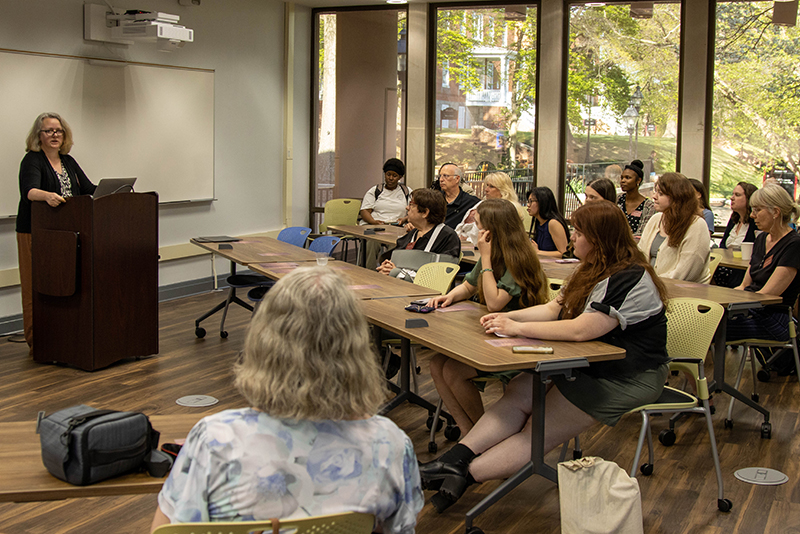Miller Library Awards Thornton Research Prize to Three Seniors
Two environmental science students and one from the Department of Education received the 2022 Ralph Thornton ’40 Research Prize from the Friends of the Miller Library and the library itself on April 13. The awards honor the best completed student research from 2022 in three categories: best project, best proposal, and best overall.

Jennifer Nesbitt, executive assistant to the dean of library and academic technology,
runs the Thornton Research Prize process and here addresses the audience at the award
ceremony.
All three winners made brief presentations on their research to an audience of about
two dozen students, faculty, staff and family members after introductions by the professors
who nominated them for their work, which had been completed in research methods courses.
Holly Myers ’23 won the top award for her research on “The Effect of Pesticides on Hoverfly Abundance and Diversity within Agricultural Settings.” Myers will be graduating this spring after just three years at Washington and will go on to graduate school at the University of Kentucky this fall.
In her presentation, Myers noted that while there is increased understanding of the need to support wild pollinators given the challenges facing domesticated honeybees, flies are often overlooked, despite being more important to pollination than butterflies and moths. Her research examined the unique threat hoverflies may face from their aquatic larval stage, since many water features in agricultural settings can have high levels of nutrients and pesticides.
Both Myers and Sharon Niedringhaus ’23, winner of the best proposal award, were introduced by Rebecca Fox, associate professor and chair of the Department of Environmental Science and Studies. In addition to noting her students’ academic excellence, Fox made sure to share with the audience a description of what goes into scientific proposals to help everyone understand how much work they represent, requiring literature reviews, annotations, bibliographies, outlines, multiple drafts, and evaluations of potential methods, study sites, and investigators.
“You have to convince people that your idea is good, that you personally can do it, and that you have methods that make sense,” Fox said. "It's research before you do the research.”
Niedringhaus won for a proposal on “The Effect of Clearcutting on Mycorrhizal Fungi in Tropical Rainforests” that laid out a method to fill a research gap in short-term impacts of forestry using an established ecological research site in Luquillo, Puerto Rico. In her presentation, Niedringhaus addressed both the intellectual merit and broader impacts her proposed research would have, requirements of the National Science Foundation and similar funding agencies. Fox said in her introduction that the proposal truly rose to a level that could be funded.
The winner for best project was Destiny Frase ’23, who studied “The Experience of Students of Color with School Resource Officers in American Public Schools.” Her work started with a review of existing research and then interviews with three students of color about their experiences. She found that while some published research shows the presence of school resource officers (SROs)—sworn law-enforcement officers working in school settings—can increase crime levels, suspensions and expulsions, the experiences of students of color were diverse and complex, and the personalities and behaviors of SROs affect the relationships they have with students and how their presence is viewed.
“I knew today was coming a long time ago. Destiny's clear view of the relationship between lived experience, in-depth research, classroom practice, and educational advocacy was established early on and has been well-nurtured in her time here at Washington College,” said Sara Clarke-De Reza, assistant professor of education. "I have no doubt that her future students, colleagues and communities will continue to benefit from the way Destiny makes sense of and seeks to improve the world.”
Alumnus Ralph Thornton ’40 originally created a research fellowship in 2012 through a gift to the library meant to encourage students to use all the resources available to them for independent research, a key element of a Washington College education. Two years ago, his gift was converted to a prize to increase participation and celebrate students’ high-quality research.